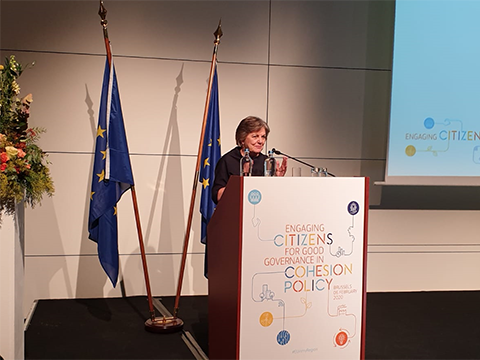Cohesion Policy wants to champion engagement of citizens. To do that, it can rely on its deeply rooted presence on the ground, direct relations with the local institutions and a genuine partnership with communities and civil society. In order to be successful, citizen engagement must be meaningful, i.e. it should lead to concrete results be it through co-designing calls, practicing participatory budgeting or promoting civic monitoring. Engaged citizens should also be rewarded for their effort an
- 25 February 2020

Cohesion Policy wants to champion engagement of citizens. To do that, it can rely on its deeply rooted presence on the ground, direct relations with the local institutions and a genuine partnership with communities and civil society. In order to be successful, citizen engagement must be meaningful, i.e. it should lead to concrete results be it through co-designing calls, practicing participatory budgeting or promoting civic monitoring. Engaged citizens should also be rewarded for their effort and know what they have achieved. On top of that, this is not something you could do overnight – it requires time and capacity building on the side of both public authorities and citizens and the organisations representing them.
This new paradigm was at the heart of the discussions during the conference on “Engaging citizens for Good Governance in Cohesion Policy” that took place on 6 February 2020 in Brussels. The event, bringing together more than 500 representatives of public institutions, academia and civil society, as well as 18 exhibitors, set the ambitious goal of giving EU citizens a bigger say on how Cohesion Policy funding should be used to address their needs and ensure the best possible results. The list of prominent international speakers sharing a wealth of knowledge and expertise was impressive. It included among others: Sanjay Pradhan, CEO of the Open Government Partnership; Yves Dejaeghere, professor at the University of Antwerp and Director of G1000 – one of the most advanced projects of citizens’ assembly in Europe, created by the German-speaking community in Belgium; Joanna Howard, Cluster Leader, Institute of Development Studies of University of Sussex; Delia Matilde Ferreira Rubio, Chair of Transparency International; and Andrés Rodríguez-Pose, Professor, London School of Economics.
All speakers agreed that the partnership principle already established in Cohesion Policy is a valid and important basis. At the same time, we all have to be more ambitious about what we can achieve in terms of benefits from a genuine citizens participation. A series of four breakout sessions explored what concretely could be done, for example in the fields of: open data and use of digital technologies; co-creation, ownership and meaningful participation; monitoring, transparency and accountability; and capacity building.
From theory to practise, two local politicians - the Mayor of Cluj-Napoca in Romania, Mr Emil Boc, and the President of Tuscany Region in Italy, Mr Enrico Rossi – inspired the audience with their concrete examples of citizen engagement for better quality of investment not only for citizens but also with citizens. Their testimonies triggered a lively and thought-provoking debate on how Cohesion Policy and EU institutions in general should seek more direct interaction with citizens in decision-making. Younous Omarjee, the Chair of REGI Committee, European Parliament, Karl-Heinz Lambertz, President of the European Committee of the Regions, Luca Jahier, President of the European Economic and Social Committee and the European Ombudsman, Ms Emily O’Reilly sent a powerful political message on the great thirst for a greater role in EU policies out there. A political message which was also very much present in the opening remarks by Minister of Regional Development and EU Funds of Republic of Croatia, Marko Pavić, and the Commission Vice-President responsible for Democracy and Demography, Dubravka Šuica. The latter also invoked a stronger role for Cohesion Policy in the forthcoming Conference on the Future of Europe.
In her conclusions, the Commissioner for Cohesion and Reforms Elisa Ferreira stressed that we should not regard the role of citizens and civil society simply as a “box-ticking exercise” or as “business as usual”. She said: “European programmes are not for personal interest they are not for party interests, they are for the public interest. So they must be run with full public involvement, from all sectors of civil society. I encourage everyone here to do everything they can to nurture a vibrant landscape of citizen engagement in cohesion policy.” The Commissioner also launched two pilot actions, supported by the Commission, and ensured the audience that this is just the beginning of a long and even stronger partnership. So, stay tuned!
More information:
- The video recordings and presentations of the Conference
- The two pilot actions on citizen engagement in Cohesion Policy
- The Integrity Pacts - Civil Control Mechanism for Safeguarding EU Funds
- Taiex Regio Peer 2 Peer - the good practice exchange platform for EU funds managing bodies
- Regio Communities of Practitioners
- ESIF Open Data portal
- At the School of Open Cohesion - an educational challenge and a Massive Online Open Course designed for high-school students involved in monitoring EU-funded projects
